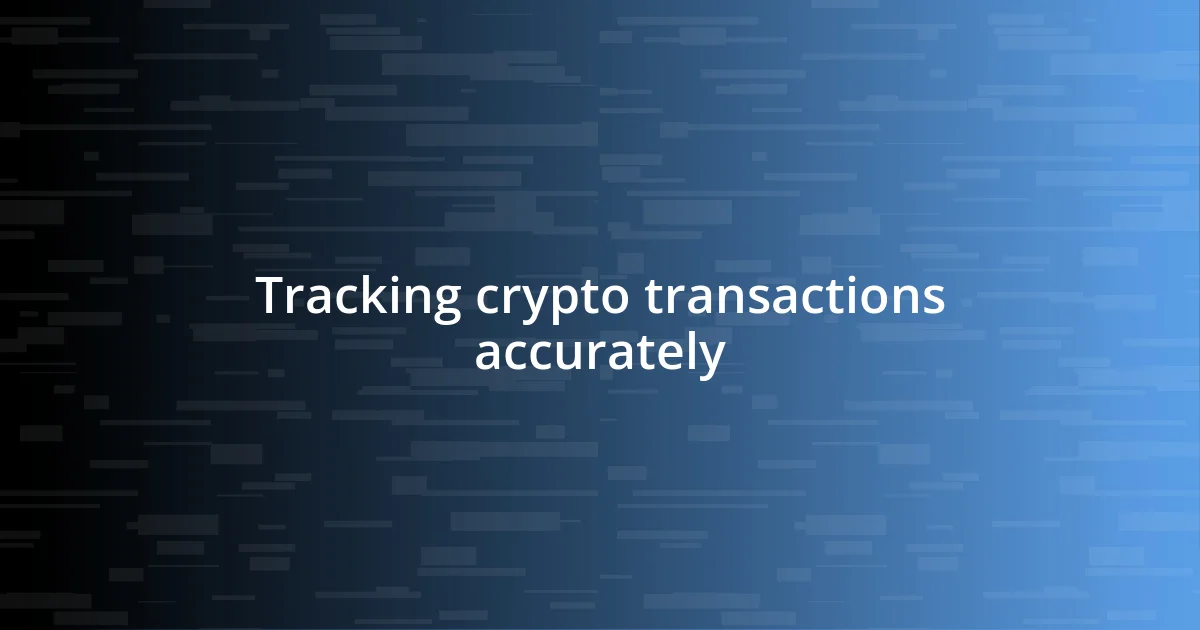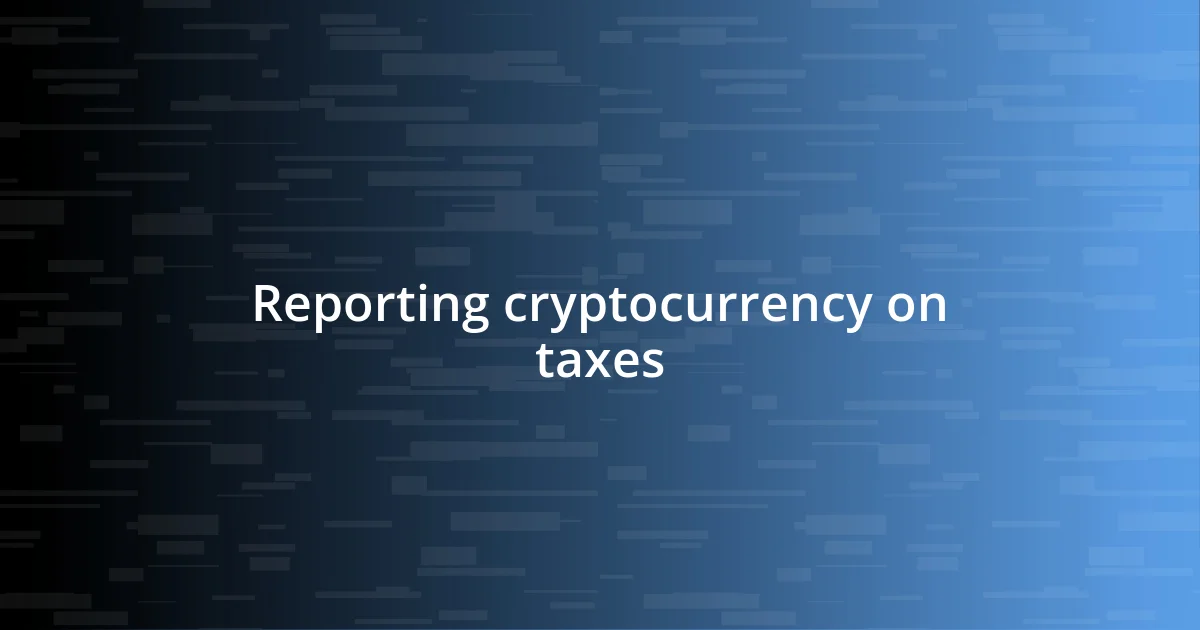Key takeaways:
- Every transaction in cryptocurrency, such as selling, trading, or using it for purchases, may trigger a taxable event, making accurate record-keeping essential.
- Utilizing tracking tools or software can greatly simplify the management of crypto transactions and help prepare for tax reporting.
- Consulting with a professional tax advisor can optimize tax strategies and potentially save significant amounts in taxes by ensuring compliance and proper reporting.

Understanding crypto tax basics
When it comes to crypto taxes, I remember the first time I was faced with this bewildering landscape. I had just sold a few altcoins for a nice profit, and my heart raced at the thought of navigating tax implications. Why is it that something as innovative as cryptocurrency comes bundled with such complex tax requirements?
The reality is, every time you sell, trade, or even use crypto to purchase goods or services, you may trigger a taxable event. It’s like a hidden layer of responsibility that many newcomers, myself included, often overlook. I once thought I could just stash my crypto away forever without consequence, but that naive mindset quickly changed when I learned about capital gains and losses.
Understanding these basics allows you to approach your crypto investments with more confidence. Trust me, tracking your transactions and keeping accurate records isn’t just busywork; it’s a crucial step in safeguarding your financial future. How can you enjoy your gains if you’re stressed about unexpected tax bills?

Taxable events in cryptocurrency
When I first delved into the world of cryptocurrency, the term “taxable events” felt daunting. I remember thinking, “What could possibly be taxable? It’s just digital money!” However, I quickly realized that numerous activities in this space can come with tax implications I hadn’t anticipated. Every buy, sell, and even staking or receiving payments in crypto can trigger a taxable event that affects my overall financial picture.
Here’s a rundown of the most common taxable events in cryptocurrency:
- Selling crypto for fiat currency: When you convert your crypto back to traditional currency, any profit is considered a capital gain.
- Trading crypto for other cryptocurrencies: Swapping one type of digital asset for another can also result in capital gains or losses.
- Using crypto for purchases: Using your crypto to buy goods or services means you need to pay taxes on any appreciated value since acquisition.
- Earning interest through staking or lending: If you earn rewards, that income is typically taxable at the fair market value on the day you receive it.
- Gifting crypto: While you generally don’t owe taxes until the recipient sells, keep in mind gifting limits may apply.
Reflecting on these events, I learned to adjust my thinking. Each transaction felt like a declaration of my financial choices, reminding me that I needed to stay on top of my records to avoid any nasty surprises.

Tracking crypto transactions accurately
Tracking crypto transactions accurately is something I can’t stress enough. I often found myself overwhelmed by the sheer volume of transactions in my portfolio, and it made me realize that without a systematic approach, I risked losing track of my financial standing. I started organizing my transactions in a spreadsheet, and it felt like a weight had been lifted off my shoulders. Each entry became a clear snapshot of my activity, making it easier to assess gains and losses accurately.
To further streamline the process, I explored various crypto tracking tools. Some of these solutions automatically sync with your wallets, recording transactions in real-time. It’s amazing how technology can simplify what once seemed like an insurmountable task. With the right tools, it’s easy to stay organized and ensure nothing slips through the cracks, which is vital when tax season approaches.
| Method | Pros |
|---|---|
| Manual tracking (spreadsheets) | Customizable and easy to understand |
| Automated crypto tracking software | Saves time and reduces error |
| Tax professional consultations | Expert guidance, tailored advice |
In my experience, the precision of tracking was put to the ultimate test during my first tax filing. I remember spending hours searching through exchanges for transaction records, feeling a mix of anxiety and determination. I realized that some platforms provide downloadable reports, which made gathering the info so much easier. Ever since, I’ve made a habit of regularly exporting reports and updating my tracking system, which alleviates a lot of stress come tax time. I can’t help but wonder: how do you keep track of your transactions? I encourage you to find a method that works for you so that you, too, can navigate tax season with confidence.

Reporting cryptocurrency on taxes
When it came time to report my cryptocurrency on taxes, I realized it wasn’t just about filling out forms; it felt like unraveling a complex puzzle. I distinctly remember sitting at my desk, surrounded by stacks of notes and receipts, thinking, “How do I even start?” The key takeaway for me was understanding that the IRS treats cryptocurrency as property, meaning every transaction could potentially trigger a taxable event. This mindset helped me approach my records with a clearer purpose.
As I navigated through the process, I learned that using specific software tools could simplify things significantly. I had a particular software that automated much of the data entry, which I struggled with initially—feeling like I was losing a grip on my financial landscape. But the moment I saw my gains and losses categorized neatly, I felt a relief wash over me. Have you ever experienced that moment where technology just clicks? That’s what it was like for me.
I can’t stress enough the importance of staying organized while reporting cryptocurrency transactions. The anxiety I felt during tax season was palpable; it pushed me to develop a method that works best for my situation. I found that being diligent about tracking each trade not only made tax time easier but also gave me deeper insights into my investment strategy. How do you handle your reporting? I encourage you to find a system that aligns with your style, so you can approach tax season with confidence rather than dread.

Deductions and credits for crypto
When it comes to deductions and credits for crypto holdings, it’s crucial to recognize the potential tax advantages available. For instance, one aspect that caught my attention was the ability to deduct investment losses. I recall a specific instance where I had to sell a portion of my crypto portfolio at a loss to rebalance my investments. It felt disheartening at first, but I learned that these losses can offset capital gains, reducing my overall tax liability. Have you ever capitalized on losses? I encourage you to keep track, as it can significantly lighten your tax burden.
Tax credits can be a bit elusive in the crypto realm. I felt a sense of excitement when I discovered certain situations that might qualify for tax credits, like contributing to specific types of retirement accounts with crypto gains. While it was a complex process, I remember the thrill of strategizing how to reinvest my crypto profits into tax-advantaged accounts. It made me rethink how to approach my investments holistically. The planning is half the battle, after all. Have you considered how your crypto might work for you in the long run?
Lastly, I’ve discovered that maintaining thorough records not only aids in claiming deductions but also helps substantiate your claims if you’re ever audited. One year, I meticulously documented every transaction, and it paid off during my tax preparation. I felt empowered, knowing I had evidence to back my claims, which alleviated a lot of stress. How do you maintain your records? A well-organized approach can transform what once seemed like a daunting task into a manageable one.

Common pitfalls in crypto taxation
Navigating the world of crypto taxation isn’t without its traps. One common pitfall I faced was failing to recognize the impact of small transactions. Early on, I brushed off a few minor trades, thinking they wouldn’t matter. To my surprise, they compounded into a substantial tax liability when everything was added up. Have you ever underestimated the importance of small actions in your financial decisions?
Another challenge I stumbled upon was overlooking the specific nature of airdrops and forks. When I received free tokens, I was excited but didn’t think about how those would be taxed. It’s wise to remember that the IRS considers these events taxable when you gain access to the crypto. Reflecting on that, I wondered, how many others might make the same assumption and miss out on properly reporting those unexpected gains? It’s a learning curve we all go through.
Lastly, my initial disregard for the holding period of my assets led to confusion down the line. I wasn’t fully aware that the length of time I held certain cryptocurrencies affected my tax rate, transitioning from short-term to long-term capital gains. This realization hit hard when I was faced with a significantly higher tax bill than I expected. Has something similar ever caught you off guard? Understanding entry and exit points can really shift how you approach your investments.

Seeking professional crypto tax advice
Seeking professional advice for crypto tax issues has been a game changer for me. When I first started trading cryptocurrencies, I thought I could handle everything on my own. It wasn’t until I faced a complex tax situation that I realized the value of consulting with an expert. Having a seasoned professional guide me through the nuances of tax codes and regulations gave me confidence and peace of mind. Have you ever felt overwhelmed and wished for a safety net?
I vividly remember my first meeting with a cryptocurrency tax advisor. I walked in feeling nervous, unsure of what to expect, but left feeling empowered. They explained concepts like capital gains and tax-loss harvesting in a way that resonated with me. It was enlightening to see how they could optimize my tax liabilities while ensuring compliance with the IRS. Have you contemplated how a professional could reshape your approach to crypto taxes?
Over time, I’ve learned that investing in professional advice can potentially save you substantial amounts in taxes. There was a time when I hesitated to incur the cost, thinking I could manage, but I ended up paying far more than necessary due to misreporting. Seeking help was a pivotal moment that transformed my tax experience. It taught me that sometimes, asking for help isn’t just smart—it’s essential. How do you approach your own financial complexities?














